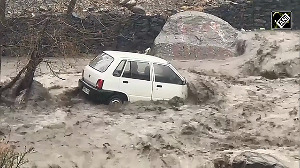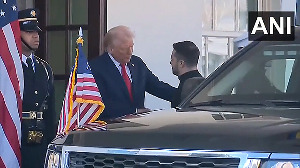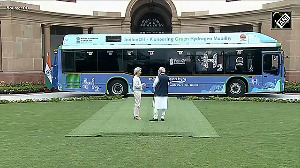Hans Blix, executive chairman of the UN Monitoring, Verification and Inspection Commission, and Mohamed El-Baradei, director general of the International Atomic Energy Agency, updated the Security Council on Friday about the searches carried out in Iraq.
Blix told the council that no weapons of mass destruction were found in the country, but did not rule out the possibility of some existing.
He said the main problem lay in locating such chemical weapons as the deadly VX nerve agent Iraq was known to have had in 1998, which are not on the Iraqi declaration.
"Another matter and one of great significance is that many proscribed weapons and items are not accounted for. One must not jump to the conclusion that they exist. However, that possibility is also not excluded. If they exist, they should be presented for destruction," Blix said.
Blix also reported findings by experts that one of Iraq's new missile systems, Al Samoud-II, exceeds the range limit set by Security Council resolutions.
"The experts concluded that, based on the data provided by Iraq, the two declared variants of the Al Samoud-II missile are capable of exceeding 150km in range. This missile system is therefore proscribed for Iraq," Blix said.
On the Al Fatah missile, Blix said: "The experts found that clarification of the missile data supplied by Iraq is required before the capability of the missile system can be fully assessed."
In a rebuttal of allegations made last week by American Secretary of State Colin Powell, he said, "In no case have we seen convincing evidence that the Iraqi side knew in advance that the inspectors were coming.
"All inspections were performed without notice, and access was almost always provided promptly."
The chief inspector also said that Iraq had accepted an offer to talk to South African experts on disarmament.
While acknowledging that many governmental intelligence agencies are convinced that proscribed weapons, items and programmes exist in Iraq, Blix said the inspectors have to rely on hard evidence.
"Inspectors, for their part, must base their reports only on evidence, which they can, themselves, examine and present publicly. Without evidence, confidence cannot arise," he said.
El-Baradei said Iraq has provided documentation on several outstanding issues, but the documents do not fully clarify the matters.
Hours before the inspectors were to make the presentation, Iraq President Saddam Hussein issued a decree banning the import or production of nuclear, biological and chemical weapons.
"Individuals and companies in private and mixed sectors are banned from importing and producing chemical, biological and nuclear weapons," the decree read.






 © 2025
© 2025